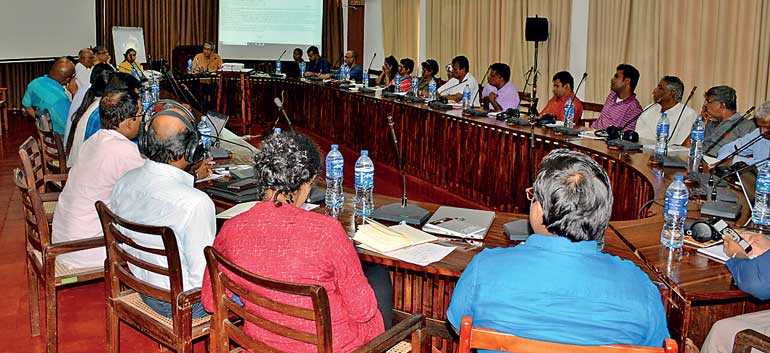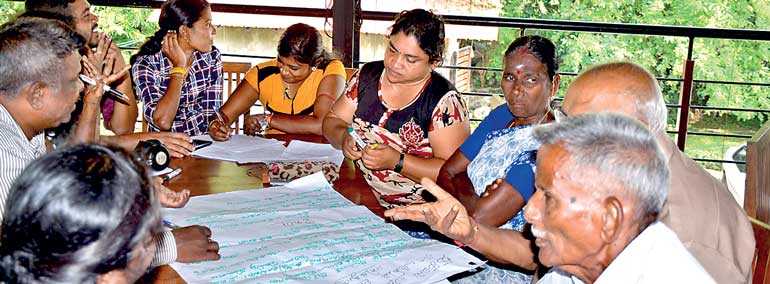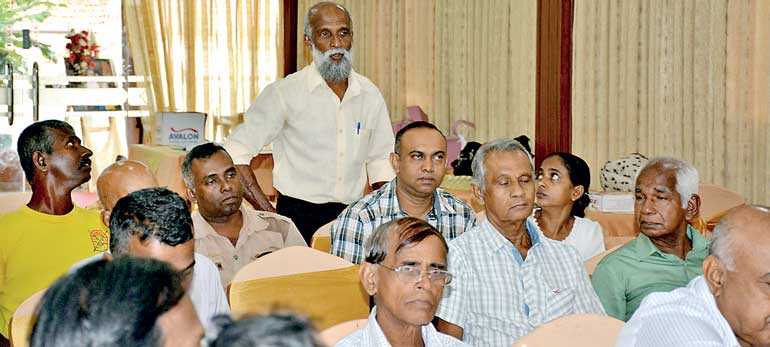Monday Mar 02, 2026
Monday Mar 02, 2026
Tuesday, 25 December 2018 00:00 - - {{hitsCtrl.values.hits}}

Brain storming during the round table discussion

Participants engaged in one of the many group activities

A participant expressing his views on the RTI Act
by Medha de Alwis
A workshop on the right to information (RTI) for civil society representatives was conducted by the Centre for Policy Alternatives (CPA) last week at the Hector Kobbekaduwa Agrarian Research and Training Institute, in partnership with the Commonwealth Human Rights Initiative (CHRI) and the Friedrich Naumann Foundation (FNF). Participants were given wide exposure to the Right to Information Act and the Right to Information Commission. The resource persons were both local and foreign, including Executive Director of the Centre for Policy Alternatives Dr. Paikiasothy Saravanamuttu, Attorney-at-Law and member of the Right to Information Commission S.G. Punichihewa, Bhaskar Prabhu and Tahmina Laskar from the CHRI among many others.
|
The head table explaining the purpose of the workshop |
Use of the Right to Information Act was discussed in detail in the Sri Lankan experience as well as abroad. The progress made by the Right to Information Commission of Sri Lanka was reviewed in detail, sharing the vast experience by the civic activists, non-governmental organizations, lawyers and the general public. Many interactive sessions and group activities were facilitated by the CPA and CHRI, discussing the procedures for seeking information under the RTI Act and regulations, identifying themes for drafting RTI applications and developing a set of suggestions to strengthen the effective implementation of the RTI Act. The workshop that was aptly moderated by Nalaka Gunawardene also featured preparation of an action plan for future improvements in the RTI engagements.
Interesting case studies were presented by the members of the public who have used the RTI Act in diverse and productive ways. One among several was to reschedule a bus service that has been stopped in the Northern Province. This seemed a prominent case as the said routine bus is the only mode of transport for the residents of the area. Another application concerned getting a Municipal Council to remove the garbage which they had been negligent of.
CPA pursued an innovative outlook not only to collect experience from the capital but to engage in dissemination of knowledge and sharing of experience at the grassroots level too. On that note, similar workshops were held in Galle and Kantale too. Similar presentations were conducted by stakeholders in the field of RTI. However, the voice of the grassroots level was most prominent in these workshops in Kantale and Galle. Simultaneously, more interesting segments were revealed which were different to that of the workshop in Colombo, engaging in diverse aspects such as involvement of minors and differently-abled persons in seeking RTI. This was a session in which school students were educated on RTI. It was heartening to note how the adolescents were taking a keen interest on an aspect that was unknown even to their elders and teachers. The students came up with bright ideas of seeking information on their education system. With such education being provided at an early stage of life, there is much hope of such adolescents growing up to be responsible citizens with a strong sense of advocacy.
The RTI by the differently-abled was equally worth a pursuit. That has been a segment that was not paid attention to date. However, the out-of-Colombo workshops facilitated the discussion of the topic. Varied issues that differently-abled persons would face in seeking RTI opened a new vista to the execution of the justice and legal procedure. As the CPA is compiling a set of suggestions for the improvement of the RTI Act, light thrown on special sectors of the social framework such as the minors and the differently-abled would be of the highest value.
Participants across the island dispersed with appreciation of the workshop, stating that it was a platform for knowledge sharing and empowerment. The issues raised, experience shared, and the knowledge disseminated in all the three workshops left the keen pursuers of the concept of RTI and the RTI Act, a useful resource to further work on paving the path to righteous access to information in ensuring social justice.